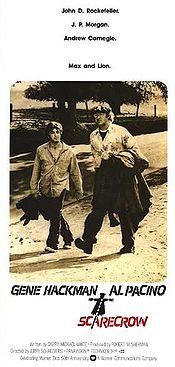
SCARECROW
US, 1973, 114 minutes, Colour.
Gene Hackman, Al Pacino.
Directed by Jerry Schatzberg.
Scarecrow won the prize for Best Film at the 1973 Cannes Festival and has been generally acclaimed critically. The film has been compared to Midnight Cowboy and Of Mice and Men in its treatment of the themes of friendship, dependence and protection. This is true. It has some advantage in theme over these two films because Max and Lion in this film are much closer to ordinary human beings than Joe and Rico in the New York gutter, or the retarded Lenny protected by George in Steinbeck's story. Again, the former film ended with death. Scarecrow does not. Whilst it is grim in its conclusion, it is certainly not \without hope.
Scarecrow is also a version of the American dream 1970s style. The narrative takes us across half of America and treats us to the optimistic ambitions of the ordinary man that, somehow or other, always seem to elude his grasp. Again, the conclusion is not altogether pessimistic. In fact, it is very strong on human values, generosity and self-sacrifice. Gene Hackman gives, possibly, his best performance. Al Pacino is also excellent in a role completely different from his Michael in The Godfather or his Serpico. This is altogether a fine film which has much to offer.
1. How did the film explain its title? Who was the scarecrow?
2. what were your impressions from the opening sequence - the road, the
countryside. Max and Lion in themselves, hitch-hiking? What brought them together?
3. How much did the success of the film depend on the audience liking and accepting Max and Lion? Why?
4. How ordinary were they as characters? How easy were they to identify with?
5. What kind of man was Max - by his own account?
6. What kind of man was Lion - by his own account?
7. Did your impression of Max and Lion coincide with their accounts of themselves?
8. How did they relate to each other? How did they change each other – such episodes as breakfast in the cafe, the lifts, odd jobs, fights, night out with the prostitutes?
9. What impact did Max's visit to Coley make in the film - human interest, revealing more about Max and Lion? Frenchie? Was it well acted?
10. Why couldn't Max settle down, even with Frenchie?
11. What was the importance of the prison sequence and its effect on them? Why did Max become sullen, hurt, selfish?
12. What was the effect of prison on Lion, especially his naivety about the homosexual prisoner and his running of things?
13. How sorry were you for Lion's wife and child, and her deadened life with the Banana King? Did she have the right to torment Lion with the death of the child? What effect did this have on Lion?
14. How satisfying was the ending - Max's devotion to Lion? The hope that Lion would recover?
15. What did the film have to offer on the themes of loneliness, companionship, protection, friendship and love? The American dream and its possibility and impossibility? Optimism and pessimism? Self-sacrifice? The importance of human beings?
16. Why did this film win the Best Film award at Cannes 1973?
17. Max: irresponsible, yet responsible; a hulking brute, yet soft; in prison; ambitious for his car-washing project - why did it have to be in Pittsburgh? The extent of his planning and saving, how real was his dream? His liking of Lion for giving him his last match? Why did he accept him as a friend and want to rely on him? Did he have a hope of fulfilling his dreams?
18. Lion: Why had he married? Left wife without seeing the child? His love in supporting it? His experience of the Navy? How naive, how shrewd? His humour? His philosophy of the scarecrow? Why did he like Max and agree to his plans? But how important was his plan to visit Detroit? How had he grown up through his experience in the Navy?
19. The enjoyment of the birthday party? Showing what life could have been like for Max. Why did he fight? Why did he want to fight?
20. Max working with the pigs, but his immediate response to Lion in trouble?
21. Sow much courage had it taken Lion to ring his wife? His visit to the Church? The lasting effect on Lion? His being physically and psychologically stunned? His longing for children? The sadness of the fountain episode and his catatonic state?
22. How did Max change - symbolised by his repeating of the scarecrow theme and making people laugh by his striptease? How human had he become?